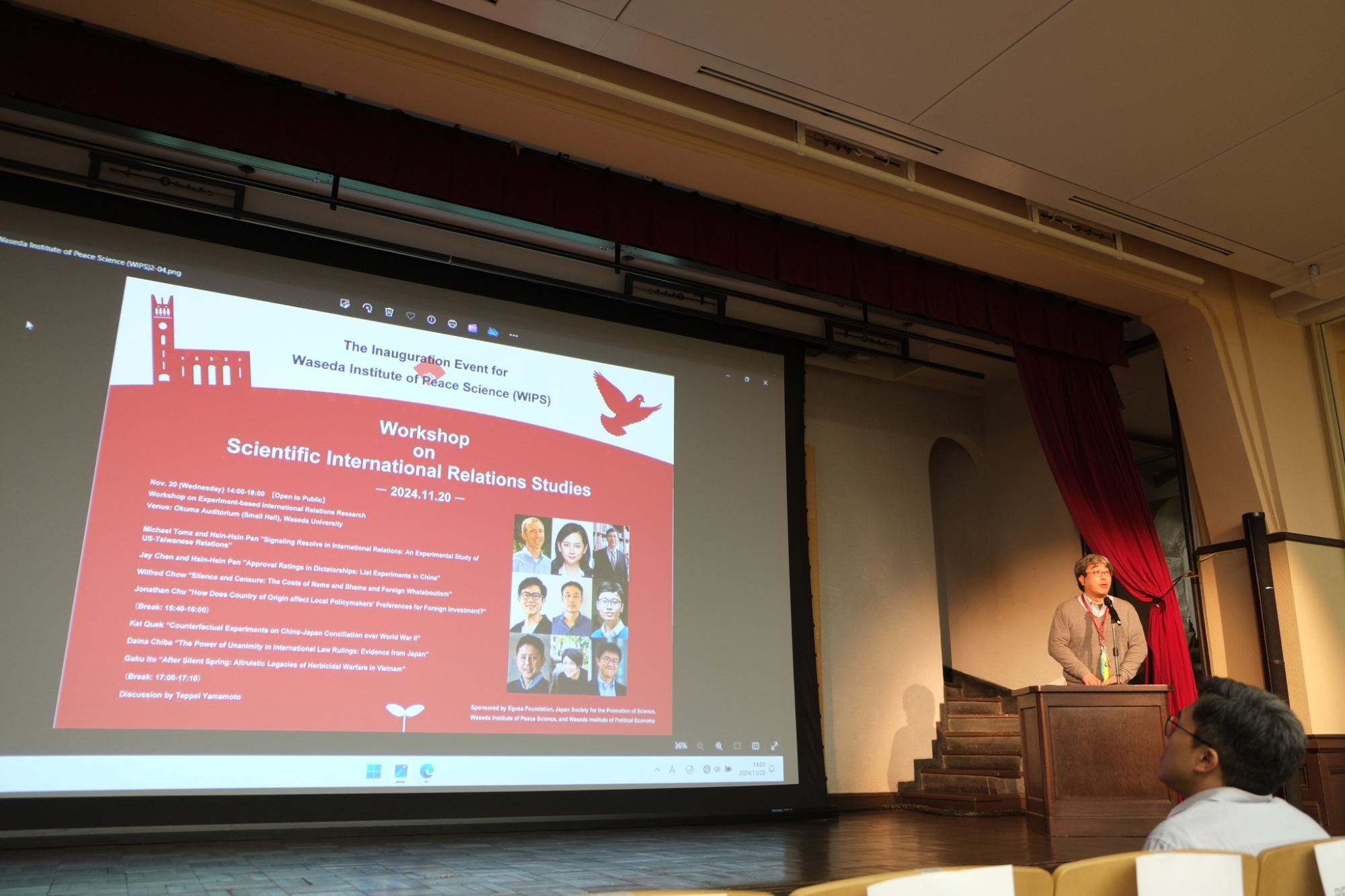Global Challenges, Scientific Solutions: GSPS Holds Workshops on International Relations Studies
Tue, Dec 3, 2024-
Tags
What if diplomacy could be as precise as science, with experimental research driving breakthroughs in alliances, conflict resolution, and trust-building? Waseda University’s Graduate School of Political Science (GSPS) explored this transformative idea at its Workshops on Scientific International Relations Studies held on November 20th and 21st.
Organized by Dr. Atsushi Tago and sponsored by various research groups in Asia, the two-day workshop brought together scholars and students to explore innovative solutions to complex international issues. The event was held in preparation for the establishment of the Waseda Institute of Peace Science (WIPS)—aimed at blending theory with practice through insightful presentations and open, constructive dialogue.
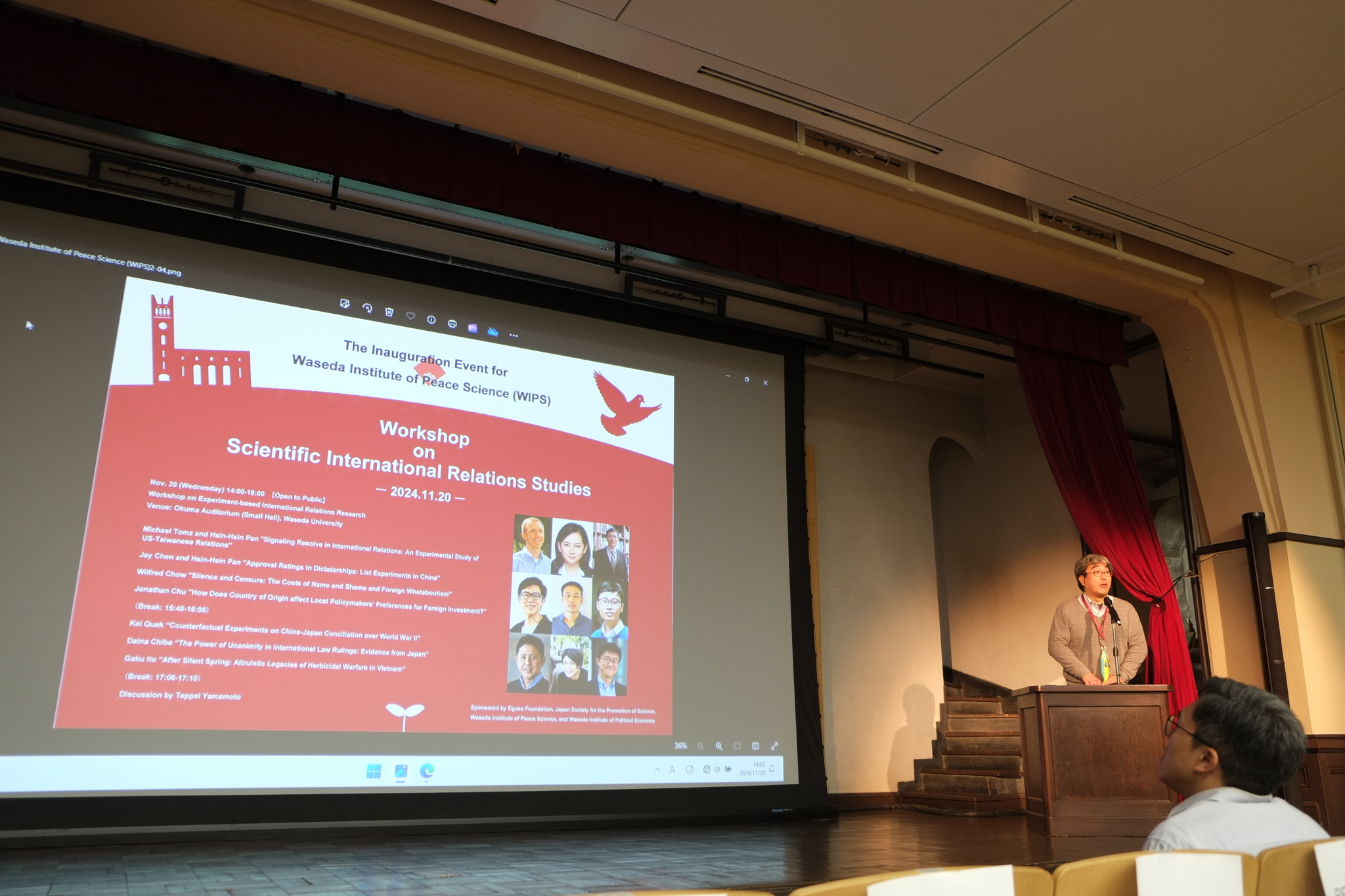
Dr. Atsushi Tago opening the event
Day 1: Experiment-Based International Relations Workshop
The first day of the workshops, held on November 20 in the Small Auditorium of Okuma Auditorium, set the stage for an in-depth exploration of experiment-based research. It was supported by the Egusa Foundation, the Japan Society for the Promotion of Science, and the Waseda Institute of Political Economy. Scholars from around the world explored topics ranging from diplomatic strategies to historical reconciliation, offering fresh perspectives and actionable insights in their respective fields.
The session opened with Michael Tomz of Stanford University and Hsin-Hsin Pan of Soochow University presenting “Signaling Resolve in International Relations: An Experimental Study of US-Taiwanese Relations.” Their research examined how the United States signals its commitment to defending Taiwan and how these ‘signals’ (e.g., presidential statements, arms sales, and military deployments) are perceived by the Taiwanese public.
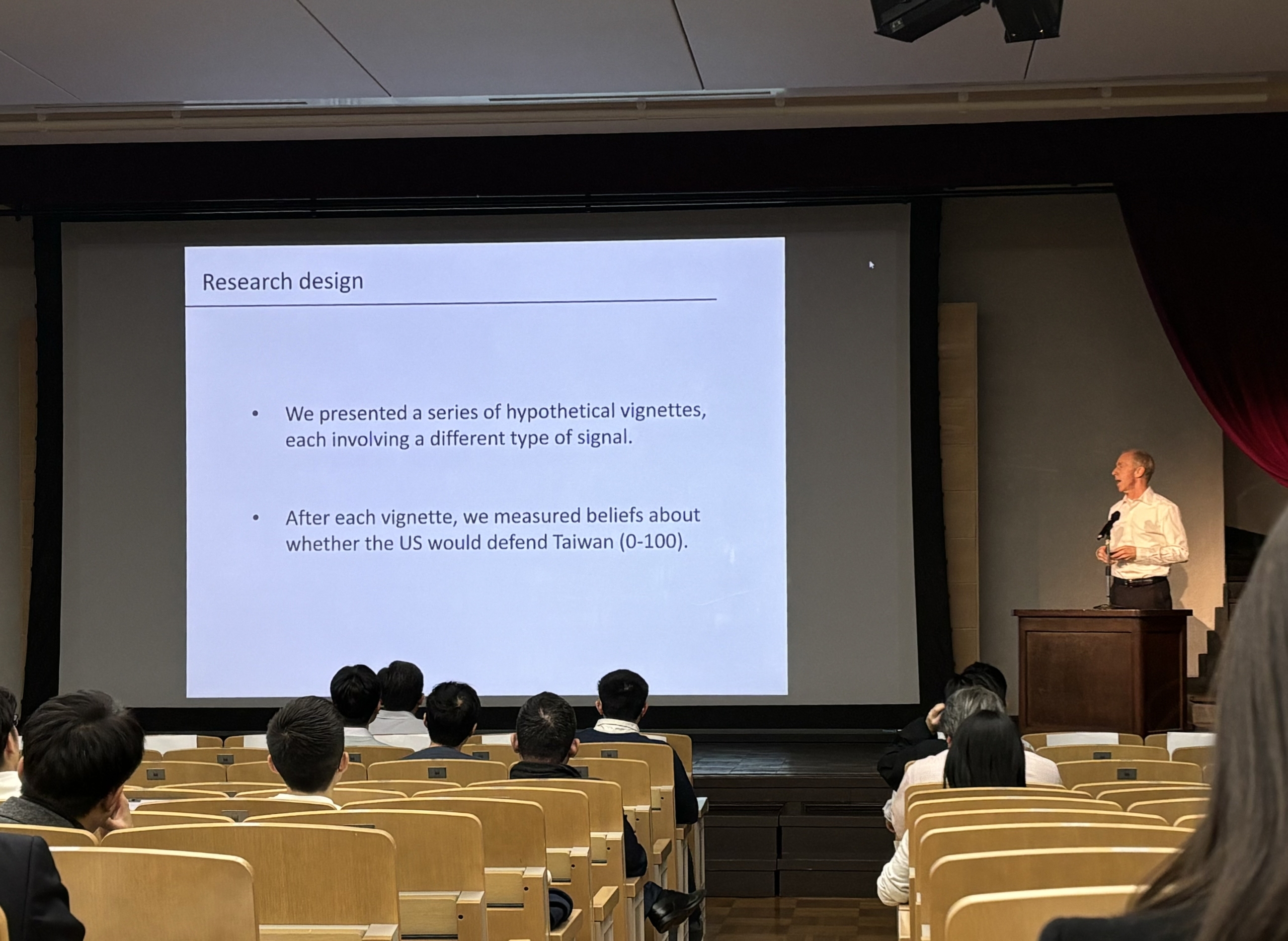
Dr. Michael Tomz of Stanford University
Next, Dr. Pan, together with Jay Chen of Academia Sinica, explored public opinion in authoritarian regimes through their presentation, “Approval Ratings in Dictatorships: List Experiments in China.” Their study highlighted methods for measuring citizen approval under restrictive authoritarian conditions, offering insights into the challenges of gauging sentiment in such political environments. Dr. Pan specifically focused on the approval ratings of China’s leadership and governance.
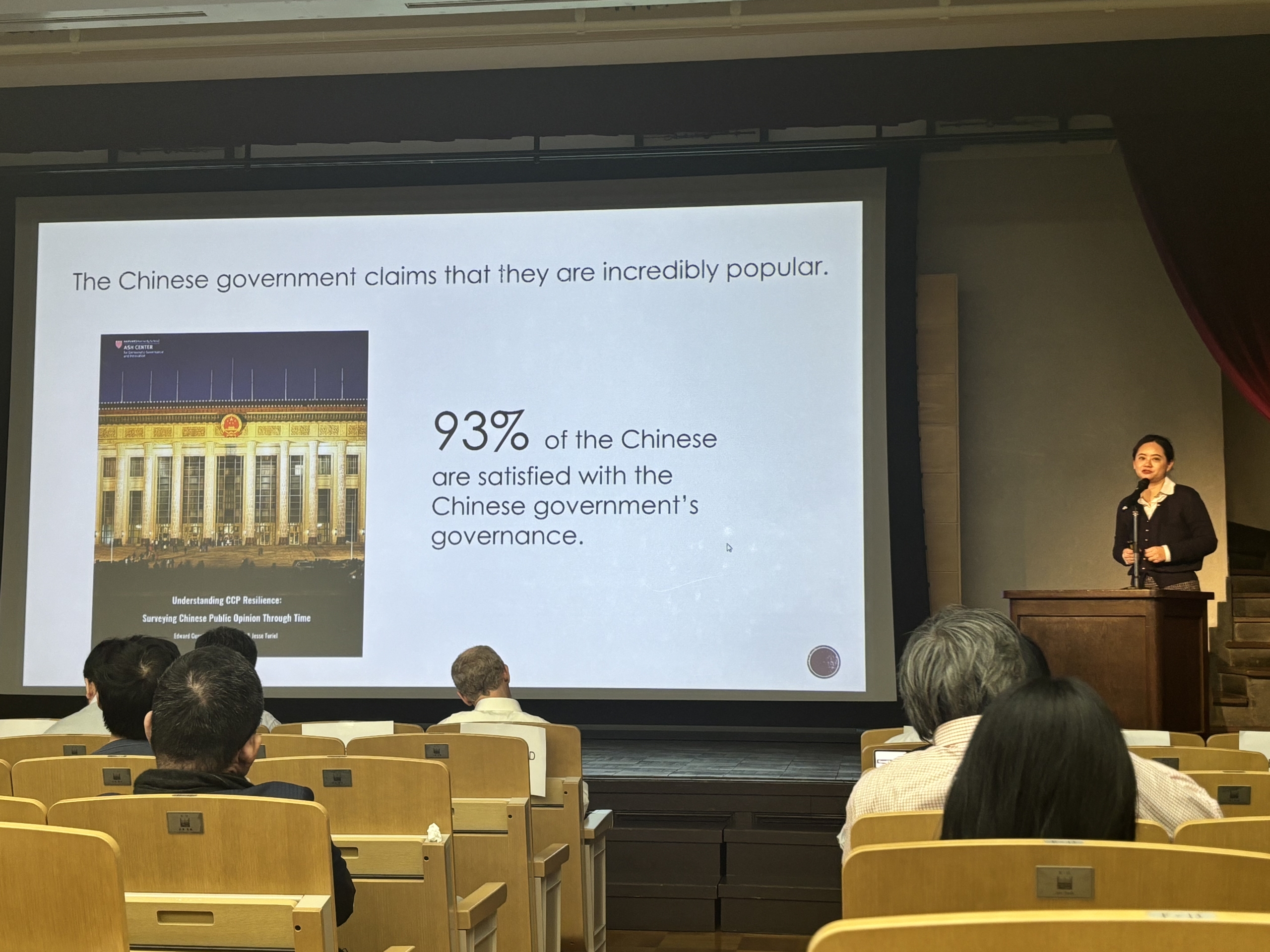
Dr. Hsin-Hsin Pan of Soochow University
Wilfred Chow from the University of Nottingham, Ningbo, China followed with “Silence and Censure: The Costs of Name and Shame and Foreign Whataboutism,” a nuanced analysis of how international criticism and deflection strategies shape diplomatic rhetoric and its consequences on global relations. Whataboutism, the practice of deflecting criticism by accusing the critic of hypocrisy, was a focal point of his presentation. Dr. Chow explored its domestic implications, particularly its influence on audiences in various states.
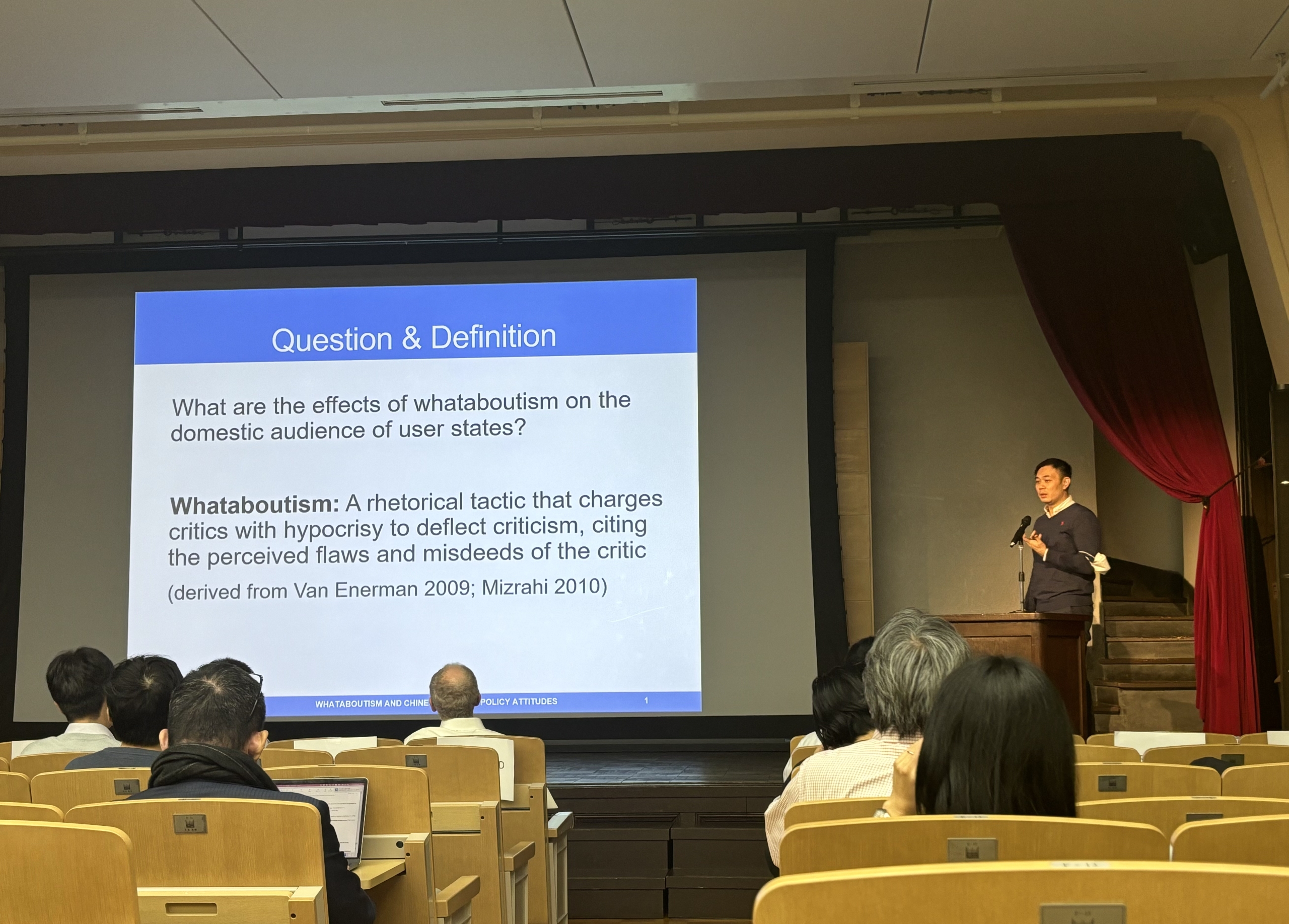
Dr. Wilfred Chow from the University of Nottingham, Ningbo, China
Jonathan Chu, of the National University of Singapore, shifted the focus to global economics with his presentation, “How Does Country of Origin Affect Local Policymakers’ Preferences for Foreign Investment?” Dr Chu’s research revealed how a country’s origin can significantly influence policymakers’ preferences.
Historical reconciliation took center stage in Kai Quek’s presentation, “Counterfactual Experiments on China-Japan Conciliation over World War II.” Dr. Quek, from the University of Hong Kong, explored potential pathways for mending relations between China and Japan, offering a fresh perspective on the enduring historical tensions between the two nations.
Daina Chiba from the University of Macau then shifted the focus to international law with “The Power of Unanimity in International Law Rulings: Evidence from Japan.” Chiba emphasized the critical role of unanimity in legal decisions, highlighting its impact on legitimacy, compliance, and global governance.
Finally, Dr. Gaku Ito of Osaka Metropolitan University delivered a presentation titled “After Silent Spring: Altruistic Legacies of Herbicidal Warfare in Vietnam.” Dr. Ito explored the far-reaching humanitarian impacts of herbicidal warfare, focusing particularly on its legacy in Vietnam, where the use of chemical agents during the conflict left profound environmental and social scars.
The first day wrapped up with an open discussion led by Dr. Teppei Yamamoto from Waseda University’s School of Political Science and Economics. The session was a great opportunity for participants to voice their thoughts and questions about the day’s presentations, including key research themes and broader issues in international relations, setting the stage for an engaging Day 2.
Day 2: Poster Session and Experiment-Based Public Diplomacy Workshop
The second day of the workshops continued the momentum of the first, with an equally packed agenda and thought-provoking sessions. The day kicked off with a poster session at the International Conference Center, sponsored by the Egusa Foundation for International Cooperation in the Social Sciences (EFICSS), and the Japan Society for the Promotion of Science. Graduate and undergraduate students shared their exciting research plans and published studies on political science and international relations. Attendees had the opportunity to explore a wide range of topics—from gender equality politics to global governance—while engaging directly with the researchers and presenters. The relaxed atmosphere encouraged lively discussions, and the snack buffet was a crowd-pleaser, helping to keep the conversations flowing.
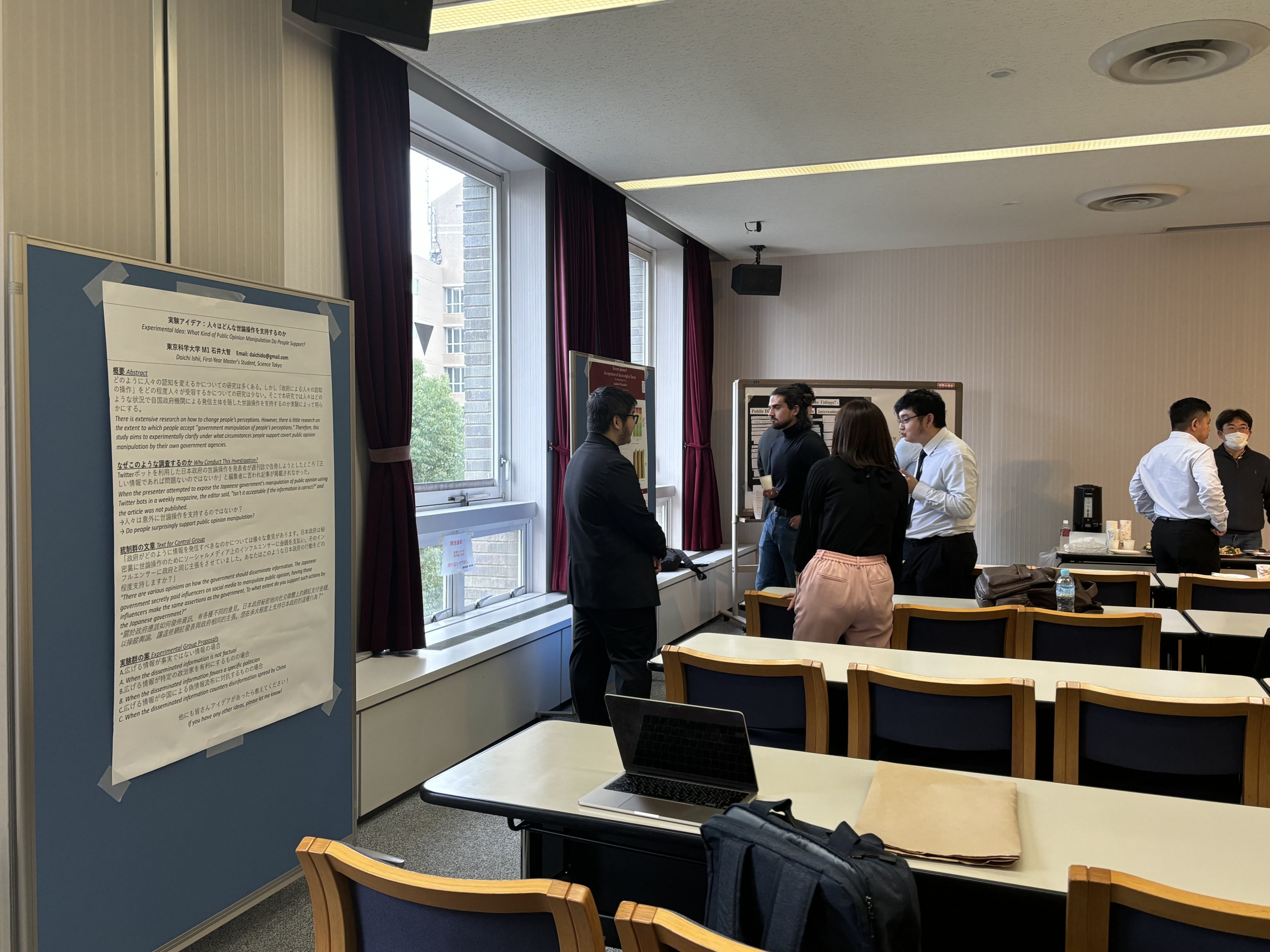
Poster Session
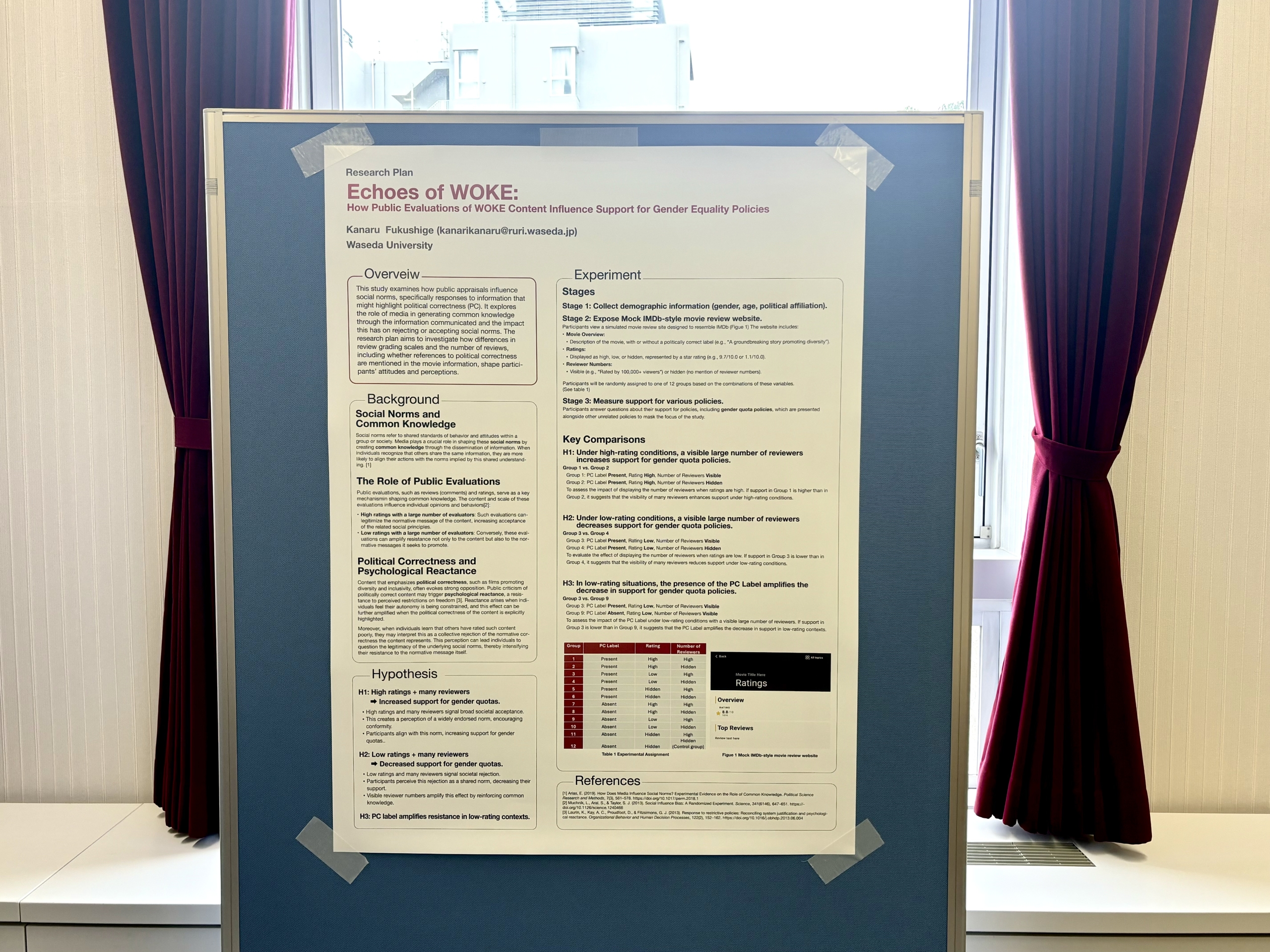
Research Plan by Kanaru Fukushige
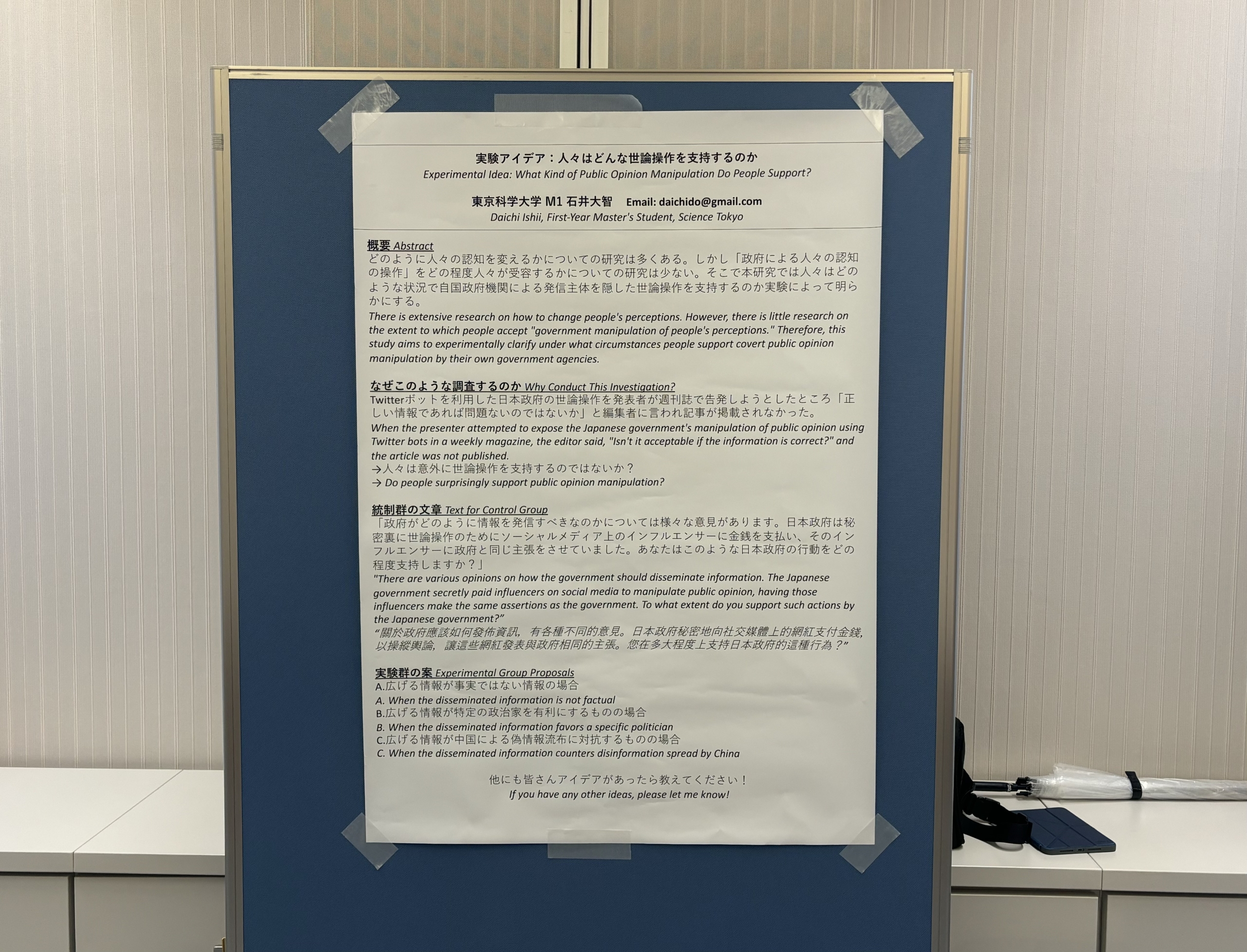
Research Plan by Daichi Ishii
The next round of workshops, focused on Experiment and Public Diplomacy, was hosted in Room 904 of Building 11 and sponsored by the EFICSS and the Republic of Korea’s Ministry of Unification. The session brought together scholars to discuss the role of public diplomacy in promoting international cooperation and understanding, particularly in the context of South Korea.
The workshop began with a presentation by Dr. Tago, titled “Scientific Evidence on Public Diplomacy in East Asia.” He highlighted the effectiveness of various public diplomacy strategies within the region, emphasizing the importance of evidence-based approaches to strengthening regional relationships.
Dr. Chow took the stage once more with “Diplomatic Whataboutism and Foreign Policy Attitudes,” offering a fresh analysis of how deflection tactics like Whataboutism influence foreign policy perceptions. His presentation examined the implications of these rhetorical strategies on public trust and global reputation.
Waseda University’s Dr. Tetsuro Kobayashi presented “Experiments in Public Diplomacy toward Asian Democracies,” exploring experimental approaches to understanding how public diplomacy initiatives resonate within democratic contexts.
The workshops concluded with a presentation by Waseda PhD student Yang Jaeseog. His research, “Korea-Japan Public Diplomacy Experiment: How Effective Signaling Can Foster Cooperation,” explored how diplomatic signaling could enhance cooperation between Korea and Japan, whose relationship is deeply influenced by historical and political complexities.
The second day concluded on a high note with open talks and networking over food. It was a fitting conclusion to two days of learning, sharing, and building bridges—both academically and personally.
More than just a series of academic sessions, GSPS’ Workshops on Scientific International Relations Studies fulfilled its core mission and achieved something beyond the classroom: fostering meaningful connections between theory and practice. What’s more, it also reflected Waseda’s broader mission: to cultivate a culture of innovation and openness. Waseda continues to serve as a welcoming space for diverse scholars and students who challenge conventional thinking in international relations.
This article was written by the following Student Contributor:
Joanna Ligon
Graduate School of International Culture and Communication Studies


